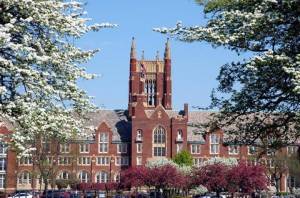
 WO WEEKS AGO I spent several days at Sacred Heart Major Seminary, Detroit, presenting at, and also attending, a workshop entitled In Service of the Sacred, and I can tell you there are wonderful things going on in the Archdiocese of Detroit. This is only possible because of the many wonderful and talented people involved there with music, including Mr. Matt Simpson, Mrs. Susan Lindquist, Mr. Joe Balisteri (Director of Music for the Archdiocese), Dr. Ron Prowse (Director of Music for Sacred Heart Major Seminary) and of course, Archbishop Allen Vigneron.
WO WEEKS AGO I spent several days at Sacred Heart Major Seminary, Detroit, presenting at, and also attending, a workshop entitled In Service of the Sacred, and I can tell you there are wonderful things going on in the Archdiocese of Detroit. This is only possible because of the many wonderful and talented people involved there with music, including Mr. Matt Simpson, Mrs. Susan Lindquist, Mr. Joe Balisteri (Director of Music for the Archdiocese), Dr. Ron Prowse (Director of Music for Sacred Heart Major Seminary) and of course, Archbishop Allen Vigneron.
I gave a talk entitled, A Firm Foundation: Catholic Choral Education and the Schola Cantorum, in which I spoke about the importance of good sacred music in the formation of the moral imagination of our youth and how that happens in a “choir school.” Afterward, 35 grade school students traipsed into the room and I gave them a 30 minute crash course in the basics of sight-singing. At the end they were able to tackle a short melody on their own. However, even more exciting were two developments I learned of while in Detroit.
First, the archbishop has created a task force at the diocesan level to chart a course for the realization of the Second Vatican Council’s vision for sacred music within the archdiocese, especially at the parish level. The task force hopes to eventually compile a diocesan “Gradual,” which will be more of a repository of readily available sources in English and Latin for singing the Propers of the Mass.
The second wonderful thing I learned about was the great work of Dr. Prowse, who has almost completed composing music for the texts of the Entrance and Communion antiphons found in the Roman Missal, which he has set to Gregorian inspired melodies as opposed to plain psalm tones. The work also includes Responsorial Psalms for the week, Alleluia chants from the Graduale Simplex and a short Kyriale:
* * PDF Download • A short sample of Dr. Prowse’s project
He has been using his settings at the seminary and many of his former seminarians have been pushing him to finish! I think it will prove to be a great resource for any group wishing to sing the Entrance and Communion antiphons at daily Mass, especially since those texts are the ones already found in many of the mainstream music collections used by parishes, such as Breaking Bread. My kuddos to Dr. Prowse! I can’t wait to see the rest of his work and to put them to good use.

